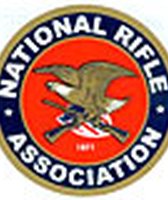Stand up for the facts!
Our only agenda is to publish the truth so you can be an informed participant in democracy.
We need your help.
I would like to contribute
Jim Moran says 70 percent of traced firearms in Mexican drug crimes come from U.S.
U.S. Rep. Jim Moran made a recent plea on the House floor to preserve requirements that licensed gun dealers in four states bordering Mexico report customers buying multiple assault rifles to the Bureau of Alcohol, Tobacco, Firearms and Explosives.
Funding for the program was a small but controversial part of a House appropriations bill setting the budget for the departments of Commerce and Justice for the fiscal year starting Oct. 1.
Moran, D-8th, said the gun-reporting program -- begun in summer 2011 -- has helped the ATF investigate illegal gun trafficking by Mexican drug cartels. "According to ATF data, 70 percent of firearms recovered and traced in drug cartel crimes in Mexico originated from the United States," he said in a May 9 floor speech.
The reporting requirement, strongly opposed by the National Rifle Association, was stripped from the House budget on March 10. The appropriations bill, which was subsequently passed by the chamber, is pending in the Senate.
We wondered if Moran is right that 70 percent of the known firearms used by Mexican drug cartels have been traced to the U.S. His spokeswoman, Anne Hughes, pointed us to an ATF report on the guns recovered from 2007-11 that the agency had traced at the request of the Mexican government.
In 2011, Mexico asked the ATF to check the origin of 20,335 firearms. The agency determined that 14,504, or 71.3 percent, had been made in or legally imported to the U.S. before getting to Mexico.
Over the five years included in the report, ATF traced 99,691 firearms for Mexico. Of those, 68,161 came from the U.S., or 68.4 percent.
An ATF news release announcing the data said all of the weapons were crime guns that were recovered in Mexico. The agency, however, did not specify the types of crime.
Moran, in describing the findings, misfired. He specifically tied the guns to "drug cartel crime."
But that doesn’t mean his statement is invalid. There are compelling reasons to believe U.S. guns play a major role in the Mexican drug trade.
Private sales of firearms are illegal in Mexico. All gun sales must go through the federal government. The license and sale application process is lengthy and only smaller-caliber pistols and rifles are available through legal means.
The ATF news release said Mexican government reports that drug trafficking organizations are increasingly using assault and sniper rifles. The agency said the guns Mexico is asking it to trace are trending away from pistols and revolvers to rifles.
Until recent years, poor record-keeping by Mexico has made it impossible to estimate the impact of drug cartel offenses on the nation’s overall crime rates.
In 2009, the Mexican government started a system for reporting drug-related homicides, but there’s not absolute faith in its data. A 2011 study by The Trans-Border Institute at the University of San Diego noted that many local Mexican police departments lack the resources to investigate whether a murder was drug related.
In 2010, the Mexican census reported 24,374 murders in the nation. The Mexican government tied 15,273 to the drug cartels. In 2009, the census reported 19,803 homicides and the government said 9,614 were caused by the cartels.
A U.S. Government Accountability Office report, conducted June 2008 through June 2009, found a close correlation between the ATF data and the percentage of guns in Mexico that originate in the U.S.
The study said, "U.S. law enforcement officials who had worked on arms trafficking in Mexico and along the U.S.-Mexican border told us their experience and observations corroborated that most of the firearms in Mexico had originated in the United States.
"Furthermore, U.S. and Mexican government and law enforcement officials also stated this scenario seemed most likely, given the ease of acquiring firearms in the United States; specifically, they told us they saw no reason why the drug cartels would go through the difficulty of acquiring a gun somewhere else in the world and transporting it to Mexico when it is so easy for them to do so from the United States."
Our ruling
Moran said ATF statistics show "70 percent of firearms recovered and traced in drug cartel crimes in Mexico come from the United States."
He muffed his statement; the U.S. guns were involved in Mexican crimes, not necessarily drug trafficking. But officials in both governments say U.S. -sourced guns make up a large proportion of guns carried by drug traffickers.
We rate Moran’s statement Mostly True.
Our Sources
Jim Moran, "Moran Speaks Against GOP Efforts to Undermine Gun Safety," May 9, 2012.
Library of Congress THOMAS, H.R. 5326, accessed May 16, 2012.
Bureau of Alcohol, Tobacco, Firearms and Explosives, Mexico trace data report, March 12, 2012.
Bureau of Alcohol, Tobacco, Firearms and Explosives, "ATF Releases Government of Mexico Firearms Trace Data," April 26, 2012.
United Nations Office on Drugs and Crime, Homicide data series, accessed May 16, 2012.
BBC, Q&A: Mexico’s drug-related violence, Jan. 25, 2012.
United States Senate Caucus on International Narcotics Control, "Halting U.S. Firearms Trafficking to Mexico," June 2011.
CIA, The World Factbook: Mexico, accessed May 16, 2012.
New York Times, "Mexico Updates Death Toll in Drug War to 47,515, but Critics Dispute the Data," Jan. 11, 2012.
Trans-Border Institute, "Drug Violence in Mexico," February 2011.
Emails from Kristen Rand, legislative director for the Violence Policy Center, May 23, 2012.
Violence Policy Center, "Indicted: Types of Firearms and Methods of Gun Trafficking from the United States to Mexico as Revealed in U.S. Court Documents," April 2009.
Government Accountability Office, "Firearms Trafficking: U.S. Efforts to Combat Arms Trafficking to Mexico Face Planning and Coordination Challenges," June 2009.
FactCheck.org, "Counting Mexico’s Guns," April 17, 2009.
Browse the Truth-O-Meter
More by Nancy Madsen
Jim Moran says 70 percent of traced firearms in Mexican drug crimes come from U.S.
Support independent fact-checking.
Become a member!
In a world of wild talk and fake news, help us stand up for the facts.

















































